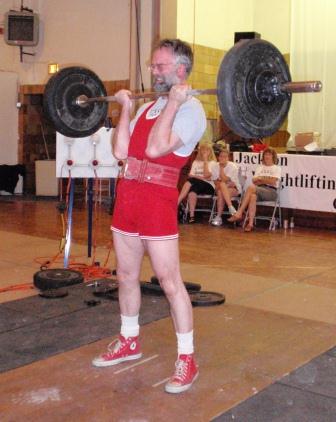by Larry Traub

Randy Smith performing the Cheat Curl at the 2011 USAWA National Championships. Randy maintains his competition bodyweight year-round by regular exercise and proper diet. (photo and caption courtesy of webmaster)
This is going to be a two part article. First I will write about the process of slowly losing weight over the course of time to get you reasonably close to your competition weight. (Probably within 5%.) The first article will be the fat loss article, which in my opinion would apply to anyone who would like to reduce the amount of fat on their body. The second article will deal with water loss (dehydration) and it’s very important that you distinguish between the two. It should also be noted that muscle loss is in no way desirable and is generally what happens to millions of people who just think in terms of “weight loss”.
Trivia question: What was Arnold’s first major movie? ————– Wrong ! Before the documentary “Pumping Iron” Arnold was in a movie with Sally Fields and Jeff Bridges called “Stay Hungry”. Prior to this movie I had spent what seemed a great deal of my life ‘staying hungry’ trying to make a competitive weight class, due to my involvement with high school and collegiate wrestling. The great irony is that it wasn’t until I decided to try my hand at bodybuilding (Arnold’s sport) that I realized that staying hungry was counterproductive to what I was trying to accomplish.
Muscle is good. I know I’m preaching to the choir given the readership of this site, but we know that muscle is so desirable that we are willing to do what we do to attain it. The question is, what can we do to retain it during the weight loss process? To make sure we retain all that valuable muscle we need to understand survival mode. The cave man eats well when game is plentiful but never knows when things will change and he may have to go an extended time without food. When he gets hungry his body anticipates a period of insufficient food and switches to survival mode. First, it slows down the body’s metabolism. Secondly, it makes muscle the preferred source of energy in order to preserve as much fat as it can, because the stored fat is what it needs to get through the period of little or no food. If it sounds like staying hungry is a bad idea then you’re getting the picture.
Not only is staying hungry a bad idea, it is a battle you have little or no chance of winning. Ghrelin, sometimes referred to as the hunger hormone, is there to make sure you lose this battle. The caveman has very little energy because his metabolism has been slowed to a crawl, he has depleted much of his muscle so his strength levels are way down and yet he has to go out there and do whatever it takes to hunt down and kill a wild animal or he will die. Ghrelin becomes his friend. It makes his hunger so intense that he is willing to do whatever it takes to feed himself. If ghrelin can make a hungry caveman go kill a bear with a club then there’s a good chance that it will make the modern day hungry man get off the couch, get in his car, go to McDonald’s and supersize whatever combo appeals to him.
How do we avoid survival mode, retain muscle, and accomplish our weight loss needs? We must avoid being hungry. I feel certain that most everyone could eat as much or more as they do now and reduce calories sufficiently to achieve a slow steady weight loss. A maximum of one pound per week is the rule of thumb that I think is ideal for weight loss. Since there is 3500 calories in a pound of fat then a reduction of 500 calories per day is what we need. You need to discover your basic metabolic rate (BMR) which is simply how many calories you would normally burn in a 24 hour period. The old formula is 15 times your bodyweight but you can google BMR and get a more sophisticated formula. The number you come up with, regardless of your method, is based on averages and it’s probable that yours is significantly better because you (as a reader of this site) should have a greater percentage of muscular composition. Finding out your true BMR is a matter of trial and error. I would suggest you use the number from your formula, subtract 300 to 500 calories and carefully evaluate the results. First, disregard the results of the first 2 weeks because there will be significant water loss due to the fact that you are changing the types of food you eat. You should probably be weighing daily, first thing in the morning and pretty much disregarding the weekly highs and lows. If you are losing slower or faster than a pound a week then make small adjustment until you are consistently losing a pound a week. At that point you’re BMR is 500 calories greater that your intake.
You can use this knowledge and an adjustment in the types of food you eat to avoid survival mode. The basic concept is this. Eat as much food as you possibly can in the process of taking in your prescribed calorie intake. You need to know that fat and sugars provide the most concentrated amount of calories per gram so minimizing your intake of both will probably result in you taking in a lot more food than you ate before you reduced your calorie intake. You will not be hungry, therefore no survival mode and your body will gladly use stored fat for energy and allow you to keep, or even build muscle during the process. And you will feel great.
As a clueless high school wrestler I was convinced that staying hungry was what I had to do. For years my parents would tell the story that during wrestling season their electricity bill would go up because I would constantly open the refrigerator, stare into it for several minutes, and then eventually close it without taking anything out. It was me against the ghrelins and I guess I defeated them for a few months each year. The sad part was, even though I loved the sport I learned to dread wrestling season because of the misery of being hungry.
Contrast that with the dieting that I did years later in preparation for a bodybuilding contest. I was eating practically no fat or sugar and I was counting every calorie by carrying around a little clicker. I can remember many times where I was watching TV in the evening and thinking about going to bed. I had eaten very well all day long and was not at all hungry. I would look at my clicker and tell my wife, “geez, I still have to eat 300 more calories.” I can still remember the sympathy my wife would express when I made these announcements. Fortunately she is not the type of person that is prone to using hand gestures.
I know that carrying around a clicker to count every calorie is probably a bigger leap than most are willing to take. In more recent years I have had a more haphazard approach with similar results. The last time I made 198 lbs for a powerlifting competition I determined how much fat loss was necessary. I allowed one week for every pound I needed to lose and made adjustments in my diet without actually counting calories. I watched my weight closely and made adjustments if I was losing too fast or too slow. It’s been several years ago now, but for a period of 6 or 7 consecutive years I competed in the masters nationals held in early May. After letting my weight climb during the holidays I would do the math and alter my diet shortly after the beginning of the year. I can honestly say I started looking forward to this time of year. I knew I could do it without any hunger and my energy level would actually improve. I guess the word diet will always contain four letters but maybe when you learn how to defeat the ghrelins you won’t have to think of it as a four letter word.
NOTE: I feel compelled to admit to plagiarism. Dr. Bryant Stamford is the local fitness Guru in the Louisville Area and writes a fitness column for the local paper and does fitness segments on the radio. He is also an accomplished author and a college professor. I am a math teacher but for years I taught an elective PE class called strength and fitness. I used many of Dr. Stamford’s articles in my class for all sorts of topics. I did not really go back and pull any articles while I was writing this but I know that most of the ideas in this article are ingrained in my head because of the many times I discussed his articles in class. Dr Stamford and I knew each other a lifetime ago when we served on an AAU committee together but since then he unknowingly become a mentor to me and I thought if I said some nice things about him then maybe I won’t hear from his lawyers. I heard him say something on the radio several years ago that relates to this article and really stuck in my head. When people realize who he is, they often want to tell him about their accomplishments. Quite often someone will brag about losing a significant amount of weight in a short period of time. (I’ve lost 25 lbs in 6 weeks.) Dr. Stamford says that he politely congratulates them but, what he really wants to say is, “Oh, I’m so sorry !” Sorry because you’ve lost muscle. Sorry because you’ve messed up your metabolism. Sorry because eventually the ghrelins will win, you will gain it back and because of your muscle loss you will be fatter then before.

